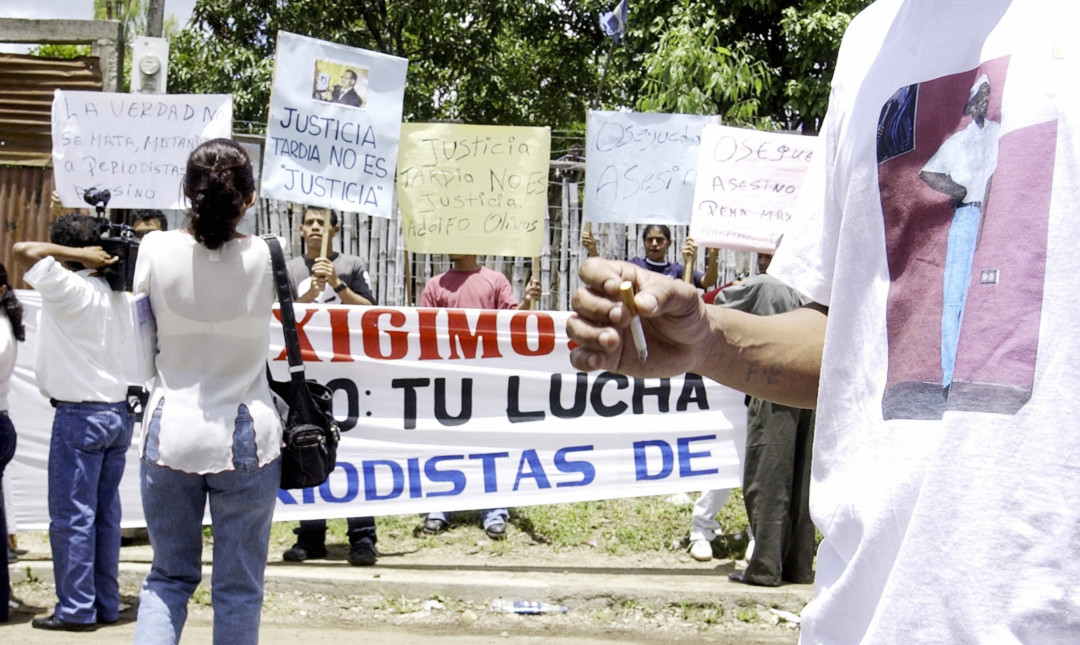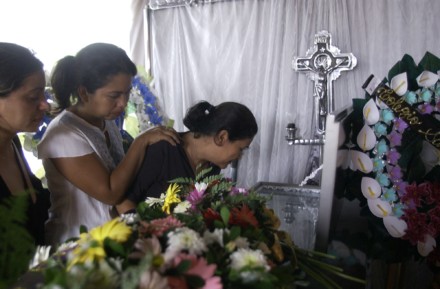14 August 2005
Esteli, Nicaragua
Adolfo Olivas
Profession
Media
Motive
Exposure of illegal activity


Adolfo Olivas


Ahmed Divela


Amit Jethwa


Artan Cuku


Babita Deokaran


Bayo Ohu


Berta Cáceres


Bhupendra Veera


Bill Kayong


Boris Nemtsov


Boško Buha


Chai Boonthonglek


Charl Kinnear


Chut Wutty


Chynybek Aliev


Cihan Hayirsevener


Daphne Caruana Galizia


Darío Fernández


Derk Wiersum


Deyda Hydara


Édgar Quintero


Edmore Ndou


Edwin Dagua


Federico Del Prete


Fernando Villavicencio


Gezahegn Gebremeskel


Gilles Cistac


Habibur Mondal


Igor Alexandrov


Jacob Juma


Ján Kuciak


Javier Valdez


Joannah Stutchbury


José Ángel Flores


Jules Koum Koum


Kem Ley


Luis Marroquín


Mahamudo Amurane


Marcelo Rivera


María Elena Ferral Hernández


Marielle Franco


Milan Pantić


Milan Vukelić


Muhammad Khan


Nelson García


Nihal Perera


Oliver Ivanović


Orel Sambrano


Perween Rahman


Peter R. de Vries


Rajendra Singh


Salim Kancil


Sandeep Sharma


Sikhosiphi Radebe


Slaviša Krunić


Soe Moe Tun


Victor Mabunda


Virgil Săhleanu


Wayne Lotter


Yuniol Ramírez


Zezico Guajajara
14 August 2005
Esteli, Nicaragua
Profession
Media
Motive
Exposure of illegal activity
Rony Adolfo Olivas Olivas had never previously received death threats for his journalistic work. He had never before faced the dilemma of having to choose between pursuing an investigation and abandoning it over concerns for his own safety. But when he was eventually presented with this decision, he went with the first option. He ended up paying for it with his life.
In the early hours of the morning on 14 August 2005, Olivas was shot and killed outside his home in Estelí, northern Nicaragua.
Olivas was a correspondent for Nicaragua’s, La Prensa, a newspaper for which he had worked for almost 15 years, and a long-standing reporter for Estelí’s local radio station, Radio Liberación.
About two weeks before his murder, Olivas had started to publish a series of articles in La Prensa together with fellow journalist and co-author Elizabeth Romero, reporting on a drug-trafficking cell operating in Estelí and other parts of Nicaragua. The findings of their research showed how Nicaragua had developed into an international drug-trafficking hub. The country had hitherto been regarded as a transit zone for drugs, rather than as a destination or replenishment market.
The first of these articles, titled Asoma gran red narco (A great narco network emerges), published on 31 July, implicated several Nicaraguans and foreigners living in Estelí in drug trafficking. One person mentioned in the article was Samuel Gutiérrez Lozano, a Mexican who had allegedly initiated trafficking operations in Nicaragua on behalf of the powerful Sinaloa Cartel. Not long after Olivas had filed his report, Gutiérrez phoned him to refute the claims, adding that he’d had to flee to Mexico to obtain proof of his innocence. A transcript of their conversation was published in La Prensa under the headline No soy jefe narco (I’m not a narco boss).
Olivas had become increasingly interested in the issue of drug trafficking in Estelí after a clandestine runway was discovered on a farm near the Nicaraguan capital, Managua, in July 2005. He resolved to unearth the names of those residents of Estelí involved in the trafficking and began following the trail of Gutiérrez’s brother-in-law, Freddy Luis Arango Cruz. He was the son of María Francisca Cruz Herrera, who would be arrested seven years later and sentenced to 15 years in prison for her role in drug trafficking as a liaison for the Sinaloa Cartel.
Shortly after the articles had been published, Olivas received a series of phone calls from a woman who demanded that he retract the information and stop his investigations, or else he would be murdered.
Although the revelatory articles were published under the bylines of Olivas and Romero, Romero did not receive any threats. ‘Adolfo faced more risks because he knew the ringleader [Gutiérrez] personally,’ explained Romero. She also revealed that Olivas had been in possession of key information concerning the drug dealers, including property plans. And when in April 2007 the Nicaraguan police conducted one of their largest anti-drug-trafficking raids to date, those arrested were discovered to have been operating just as Olivas had claimed in his investigative reports.
The threats did not deter him from pursuing his investigations. ‘My dad took no security measures,’ Olivas’s daughter, Benazir Olivas Melgara, said. ‘He didn’t think they were capable of killing him.’ The only precaution that he did take was to approach the Nicaraguan Association for Human Rights to relay his findings and seek their advice. The organization’s director, Roberto Petray, confirmed that Olivas had asked him to accompany him to file a formal complaint with the Nicaraguan police.

Residents of Estelí demand an exhaustive investigation into the assassination of Olivas

Relatives mourn over Olivas’s coffin
On the day of his murder, Olivas was returning from a night out. He and a friend had been to a club called La Pasadita and had shared a ride home in a taxi. The taxi driver, Santos Roberto Osegueda Palacios, had first dropped off Olivas’s friend; then, after arriving at Olivas’s home, had climbed out of the car and fired two gunshots into the journalist’s back, perforating his heart and one of his lungs. According to witnesses, Olivas’s last words were, ‘They got me.’
The crime took place at about 4 a.m. Osegueda claims that when he tried to collect his fare, Olivas pulled out a gun to shoot him, and he had fired in self-defence. But another passenger who was in the taxi at the time refuted this version of events.
In October 2005, Osegueda was sentenced to 25 years in prison for murder. The court’s conclusion that the crime was a straightforward murder angered Estelí residents, who demonstrated outside the prosecutor’s office, demanding that the case be investigated as an assassination with links to drug traffickers. The public outcry was based on the fact that Olivas had revealed the names of six people allegedly linked to drug trafficking just a couple of weeks before he was murdered: four lawyers, the son of a politician and an ex-policeman. Olivas’s research suggested that these individuals were laundering the money they earned from trafficking drugs.
The Inter-American Press Association, a media advocacy group, urged the authorities not to rule out of the murder investigation the threats Olivas had received. Yet, neither the Nicaraguan police nor the prosecutor’s office has investigated the people revealed by Olivas in his reports. ‘The police did not take into account all the likely causes of the crime,’ said Romero. ‘They preferred to close it as a common crime committed by a heated cab driver who ended up shooting his passenger over a payment dispute.’
Olivas’s friends and family regret that the journalist’s murder has been reduced to an argument about a taxi fare. Benazir Olivas said that the family have chosen not to look into the true motives of the murder out of fear of what may happen to them if they were to. ‘The people on that list were from Estelí; if we keep investigating, they could do something to us.’


2 March 2016
Honduras
Berta Cáceres


6 November 2011
Penonomé, Panama
Darío Fernández


15 May 2022
Santander de Quilichao, Colombia
Édgar Quintero


7 December 2018
Cauca, Colombia
Edwin Dagua


9 August 2023
Quito, Ecuador
Fernando Villavicencio


15 May 2017
Culiacán, Mexico
Javier Valdez


18 October 2016
Tocoa, Honduras
José Ángel Flores


9 May 2018
San Luis Jilotepeque, Guatemala
Luis Marroquín


9 July 2009
San Isidro, El Salvador
Marcelo Rivera


30 March 2020
Papantla, Veracruz, Mexico
María Elena Ferral Hernández


14 March 2018
Rio de Janeiro, Brazil
Marielle Franco


15 March 2016
Honduras
Nelson García


16 January 2009
Valencia, Venezuela
Orel Sambrano


13 October 2017
Santo Domingo, Dominican Republic
Yuniol Ramírez


31 March 2020
Zutiwa, State of Maranhão, Brazil
Zezico Guajajara